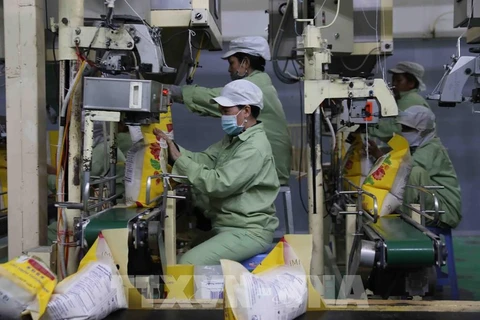Hanoi (VNA) – To gain a firm foothold in the European market, Vietnamese enterprises have been advised to soon adapt to the European Green Deal (EGD) to meet new requirements of this choosy market.
According to the Vietnam Chamber of Commerce and Industry (VCCI)’s Centre for WTO and International Trade, in the first 10 months of 2023, Vietnam’s export value to the EU surpassed 36 billion USD.
To achieve sustainable export, it is necessary to have appropriate preparations and be ready to comply with the EGD, which is an urgent requirement for Vietnamese manufacturers and exporters in the coming time, according to experts.
However, a recent survey by the VCCI showed that 88-93% of respondents have never heard or have only briefly heard about the deal.
The EGD, launched in 2020, is a package of policy initiatives aiming to set the EU on the path to a green transition, with the ultimate goal of reaching climate neutrality by 2050.
In fact, since the enforcement of this deal, there have been many green policies that have directly affected foreign goods imported into this region as well as production and export of products from Vietnam to this market.
Accordingly, Vietnam’s exports forecast to be most impacted by the green transition process in the EU in the coming time include electric and electronic products, machinery, equipment and components, farm produce, aquatic products, wood and wooden products, iron and steel, garments, and footwear.
VCCI Vice President Nguyen Quang Vinh said that as regulations on the EGD are diverse, without a common roadmap, Vietnamese businesses need to proactively learn about and understand the regulations and policies which have affected the industries and products so as to have thorough preparations and suitable transition.
Some economists advised businesses themselves to identify difficulties and challenges facing their products caused by EGD regulations so as to accurately grasp and regularly update specific EU green policies related to each type of export to gradually adapt to and ensure compliance with mandatory requirements.
They also stressed the need for the State to issue policies to support enterprises in green industrial development, and those to attract more investment./.
According to the Vietnam Chamber of Commerce and Industry (VCCI)’s Centre for WTO and International Trade, in the first 10 months of 2023, Vietnam’s export value to the EU surpassed 36 billion USD.
To achieve sustainable export, it is necessary to have appropriate preparations and be ready to comply with the EGD, which is an urgent requirement for Vietnamese manufacturers and exporters in the coming time, according to experts.
However, a recent survey by the VCCI showed that 88-93% of respondents have never heard or have only briefly heard about the deal.
The EGD, launched in 2020, is a package of policy initiatives aiming to set the EU on the path to a green transition, with the ultimate goal of reaching climate neutrality by 2050.
In fact, since the enforcement of this deal, there have been many green policies that have directly affected foreign goods imported into this region as well as production and export of products from Vietnam to this market.
Accordingly, Vietnam’s exports forecast to be most impacted by the green transition process in the EU in the coming time include electric and electronic products, machinery, equipment and components, farm produce, aquatic products, wood and wooden products, iron and steel, garments, and footwear.
VCCI Vice President Nguyen Quang Vinh said that as regulations on the EGD are diverse, without a common roadmap, Vietnamese businesses need to proactively learn about and understand the regulations and policies which have affected the industries and products so as to have thorough preparations and suitable transition.
Some economists advised businesses themselves to identify difficulties and challenges facing their products caused by EGD regulations so as to accurately grasp and regularly update specific EU green policies related to each type of export to gradually adapt to and ensure compliance with mandatory requirements.
They also stressed the need for the State to issue policies to support enterprises in green industrial development, and those to attract more investment./.
VNA
























